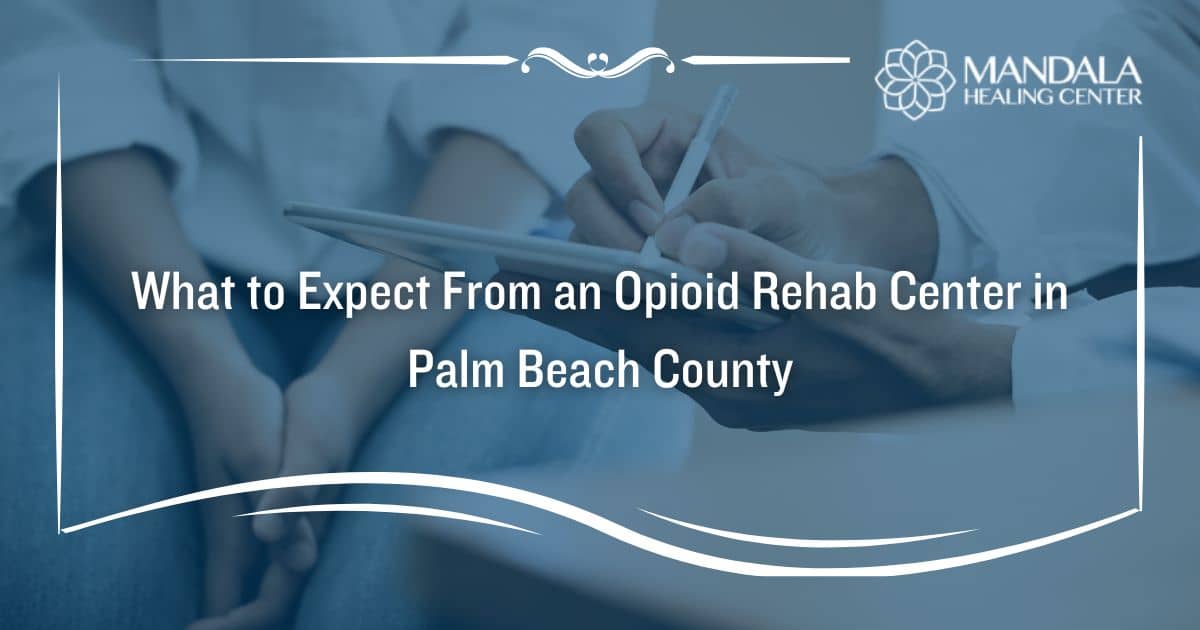People who develop dependence or addiction to opioids often require professional treatment, supervision, and ongoing support to stop using these potent drugs safely. Understanding what will happen in an opioid rehab center in Palm Beach County may help you prepare for your time in treatment and stay motivated during each stage of your recovery.
Contact the Mandala Healing Center specialists to learn more about our holistic approach to substance abuse treatment or to find support at any stage of your recovery journey.
What Are Opioids?
Opioids are a type of drug that includes prescription pain relievers, including oxycodone and hydrocodone, and illegal drugs like heroin. Doctors may prescribe opioid painkillers to help people manage pain after surgery or chronic medical conditions. Opioid medications can cause side effects that people may find pleasant or desirable, making them want to use more of the medication than they should. Or, people may use these drugs recreationally–meaning without a prescription.
Opioids produce a range of side effects, including:
- Relaxation
- Drowsiness
- Euphoria
- Slow breathing
Opioids work by binding to receptors in areas of the brain associated with pleasure and reward. They also cause your brain to produce more dopamine, which is a neurotransmitter involved in pain reduction and pleasure.
Because opioids can cause feelings of pleasure and relaxation, people may want to take higher or more frequent doses of these drugs. However, repeated or heavy use can cause changes in how the brain and body work, making it very difficult to stop using them. If you stop taking opioids suddenly after a prolonged period of use, you’re likely to have intense cravings and other unpleasant withdrawal symptoms.
Many people require professional treatment and support to safely stop using opioids and avoid relapse for life.
Common Opioids
Doctors may prescribe opioid medications to patients who have had surgery or dental procedures. They may also prescribe them to those who need help managing pain from a chronic condition. Some of the most commonly-prescribed opioids include:
- Oxycodone–OxyContin or Percocet
- Hydrocodone–Vicodin
- Oxymorphone
- Dilaudid
- Codeine
- Fentanyl
- Tramadol
- Tapentadol
- Meperidine
- Morphine
People should only take opioid medications as prescribed and be aware of signs of dependence or abuse. While recreational use is more likely to lead to addiction, anyone who takes these drugs may misuse them and develop dependence.
Detox at an Opioid Rehab in Palm Beach County
Detoxing from opioids can be a challenging process. People often experience intense withdrawal symptoms that can linger for days, weeks, or even longer. Symptoms of opioid withdrawal may include:
- Nausea
- Vomiting
- Sweating
- Chills
- Insomnia
- Anxiety
- Elevated body temperature
- High blood pressure
- Racing heart
- Intense body aches and bone pain
- Cravings
For most, an opioid rehab in Palm Beach County begins with a medically-supported detox program. During detox, patients receive care, supervision, and treatments from medical and support professionals, allowing them to get through detox safely and comfortably.
Treatment includes:
- Medications to reduce psychological and physical withdrawal symptoms, including Buprenorphine, Methadone, Suboxone, and Clonadine
- Emotional support, including individual therapy when appropriate
- Exercise, nutrition support, massage, and other holistic therapies to soothe the mind and body
People with co-occurring mental illnesses receive treatment for withdrawal symptoms and mental health simultaneously.
A detox may take several days or weeks, depending on the severity of your opioid use and other personal factors. After completing detox, ongoing treatment and aftercare are essential.
Treatment in an Opioid Rehab Program
Overcoming opioid abuse and addiction means addressing all the aspects of addiction. Detox alone is not enough to provide long-lasting recovery. Instead, people must seek comprehensive treatment and develop an aftercare plan to keep them engaged in recovery for the rest of their lives.
Opioid addiction treatment programs are available in several levels of care and many settings. Before starting treatment, a doctor or addiction specialist will evaluate your needs and recommend a level of care. Many people require inpatient treatment to manage acute withdrawal symptoms and avoid relapse before detox is complete.
After a safe, complete detox, you will continue participating in a treatment program to help you identify and heal the roots of your substance abuse and learn new skills to avoid relapse.
Treatment plans typically include:
- Individual counseling
- Group and family therapy
- Medications
- Mental health treatment
- Holistic therapies
- Relapse prevention education
During rehab, you will also develop an aftercare plan to keep you engaged in recovery after completing treatment. Your aftercare plan may include sober living, attending 12-step meetings, group therapy, individual therapy, and other activities to keep you committed to sobriety.
Find Opioid Rehab in Palm Beach County Now
Opioid addiction can be destructive to your health, emotional well-being, relationships, and more. You don’t have to carry the weight of addiction alone. Compassionate, effective treatment is just a phone call away. Reach out to the Mandala Healing Center specialists today to explore our holistic treatment programs or to find support during your recovery.












